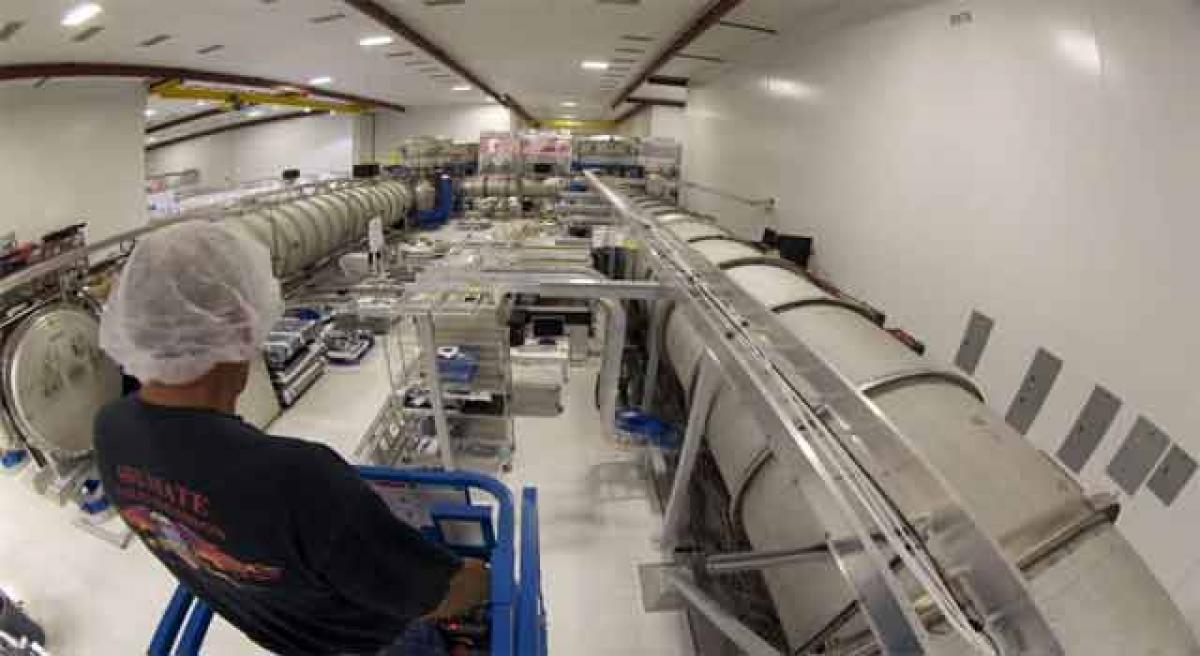Live
- Over 7,600 Syrians return from Turkiye in five days after Assad's downfall: minister
- Delhi BJP leaders stay overnight in 1,194 slum clusters
- Keerthy Suresh and Anthony Thattil Tie the Knot in a Christian Ceremony
- AAP, BJP making false promises to slum dwellers for votes: Delhi Congress
- 'Vere Level Office' Review: A Refreshing Take on Corporate Life with Humor and Heart
- Libya's oil company declares force majeure at key refinery following clashes
- Illegal Rohingyas: BJP seeks Assembly session to implement NRC in Delhi
- Philippines orders full evacuation amid possible volcanic re-eruption
- Government Prioritizes Welfare of the Poor, says Dola Sri Bala Veeranjaneyaswamy
- Two Russian oil tankers with 29 on board damaged due to bad weather
Just In

Thrilled at the detection of the elusive gravitational waves a century after Albert Einstein\'s prediction and the first observation of collision of two black holes at the Interferometer Gravitational-wave Observatory (LIGO), two young US-based Indian researchers working on the project say the waves act as a sixth sense for humans to comprehend the universe.
Kolkata: Thrilled at the detection of the elusive gravitational waves a century after Albert Einstein's prediction and the first observation of collision of two black holes at the Interferometer Gravitational-wave Observatory (LIGO), two young US-based Indian researchers working on the project say the waves act as a sixth sense for humans to comprehend the universe.
In fact, these "ripples in the curvature of space and time" will provide information on the cosmos that wouldn't have been possible by peering through any kind of telescope, say Karan P. Jani and Nancy Aggarwal, who are elated at the prospect of India getting a third LIGO (observatory) and being at the forefront of new-age astrophysics.
Last month, India and the US signed an agreement for a new LIGO project in India during Prime Minister Narendra Modi's visit to Washington. The agreement was signed between India's Department of Atomic Energy and the US' National Science Foundation (NSF).
The prime minister also met Indian student scientists, including Aggarwal and Jani, associated with the LIGO project.
"Gravitational waves are a completely new way of seeing the universe. It's like humans can now perceive the sixth sense beyond the five, to comprehend the universe," Jani, a fourth year PhD researcher in astrophysics at the Georgia Institute of Technology, told IANS via email.
Physicists have concluded that the detected gravitational waves were produced during the final fraction of a second of the merger of two black holes to produce a single, more massive spinning black hole. This collision of two black holes had been predicted but never observed.
Jani and Aggarwal explained the detectors led to "direct observation of existence of black holes as also a direct observation of mergers of two black holes into a bigger black hole."
"The energy released during collision was 50 times more than all the stars in the universe combined at that instance," added Jani, whose work involves simulating black holes on supercomputers and searching for massive black hole collisions in LIGO data.
The LSC currently includes over 1,000 members from 90 institutes and 16 countries. India is the third highest right now in terms of membership.
At the heart of the mammoth hunting game to catch the unicorn are tools called interferometers which work by merging two or more sources of light to create an interference pattern that can be measured and analyzed.
"It is a four km light interferometer... in fact LIGO is the most precise measurement ever done. This means a lot of technology research has to be done to make LIGO," Aggarwal, a fourth year Ph D student at MIT LIGO Lab, told IANS via email.
Aggarwal is studying quantum mechanics to improve the precision of gravitational wave detectors and is glad that the starting of the LIGO India project opens up a new opportunity for her to work in her native country.
"A lot of technological developments that were made for LIGO have found independent applications in science as well as industry and LIGO India will create a lot of opportunities for Indian scientists and engineers and improve the general scientific and technological environment," Aggarwal emphasised.
They hope to "share the discovery with a larger audience", a request put in by Modi during their meeting.

© 2024 Hyderabad Media House Limited/The Hans India. All rights reserved. Powered by hocalwire.com







